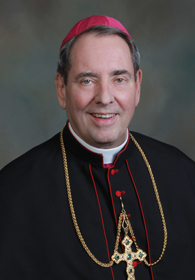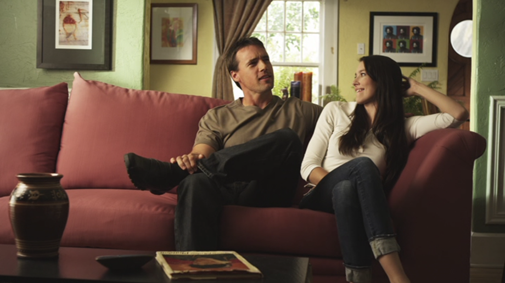Welcoming and Accompanying
 Recently, the Archdiocese of Detroit, the apostolate Courage, and Sacred Heart Major Seminary (particularly Dr. Janet Smith) organized a conference entitled, “Welcoming and Accompanying Our Brothers and Sisters with Same-Sex Attraction.” There were close to thirty speakers and four hundred participants with the same goal of meeting the pastoral needs of persons who experience this attraction in their lives.
Recently, the Archdiocese of Detroit, the apostolate Courage, and Sacred Heart Major Seminary (particularly Dr. Janet Smith) organized a conference entitled, “Welcoming and Accompanying Our Brothers and Sisters with Same-Sex Attraction.” There were close to thirty speakers and four hundred participants with the same goal of meeting the pastoral needs of persons who experience this attraction in their lives.
Archbishop Vigneron gave the closing homily for the conference, focusing on the various ministers present (ordained or lay) and their calling. He drew a parallel with Moses leading the people out of slavery in Egypt, saying that, “We have all, to some degree, depending on our state of life, received the baton from the new Moses, Jesus Christ” and reminded the participants that, “There’s a lot of tough stuff between Egypt and Jerusalem, not least leaving behind the old creation, the old self, and becoming a new creation.” Archbishop Vigneron pointed out that the Israelites often chafed against Moses because of the hardships of the journey, but, “To have high aspirations for people — that’s love. To be willing to accompany them on the passage to paradise, to the New Jerusalem — that’s love.”
The archbishop noted that Christ, “made the victory available to us. He is the last word and the full word, about happiness, the way, the truth, and the life.” Ministers are not perfect; it’s okay to stumble sometimes in the effort to help others. “Very likely as we accompany our brothers and sisters there will be stumbling. But stumbling is not a tragic failure when one is accompanying a brother or sister to the promised land. Stumbling becomes by the power of Christ a point for setting out anew with even greater confidence to lay hold of the victory that is inevitable.”
Finally, Archbishop Vigneron ended with a challenge and hope: “People think we’re old fashioned. We’re not. We’re subversive. We’re undermining an established order. Not for its own sake. Not just to be recalcitrant. But because of what God has asked us to do. We do it in love, we do it with patience, we do it in the power of the Holy Spirit. I praise and thank God that the Holy Spirit is abroad in our time and in our place.”
Read the full text at the diocesan website.
Archive
How does the Church's teaching on marriage relate to people who experience same-sex attraction?
Note: Much attention has been given to a media question and answer session with Pope Francis on the papal flight home from World Youth Day in Brazil. See coverage and context from Catholic News Service here and here. It would be an opportune time to re-visit what the Church teaches about persons who experience same-sex attraction. The following is from the Common Good page on this website and addresses the common question: “How does the Church’s teaching on marriage as the union of one man and one woman relate to people who experience same-sex attraction?” Below the answer are helpful links to further sources of Church teaching, as well as pastoral guidelines and ministries for persons with same-sex attraction.
Jesus was very confident in speaking the truth. He was not confined by the traditions of His time. He did and spoke what He knew was the truth. He Himself is the Truth. Jesus did not discriminate, yet he clearly taught that marriage is only between one man and one woman. He also clearly disagreed with sexual behavior outside of marriage. As Jesus did, the Church teaches that marriage between one man and one woman is the only proper context for sexual relations.
The Church’s teaching on marriage recognizes that every human person is made in the image of God and has inviolable dignity. Every human person is a gift, deserving respect and love. It is important to acknowledge that persons with homosexual inclinations have suffered and can suffer a great deal. Historically, they have been treated as second class citizens in many instances. Often, the early years of persons who experience same-sex attraction can be very painful, and can include long periods of loneliness, confusion about their own feelings, the pain of self-hatred, and most sadly, even thoughts of suicide. Unfortunately, some have gone so far as to act on these thoughts.
The Church cares for and accepts persons who experience homosexual inclinations. She refuses to label anyone. Many with a homosexual inclination attend Mass regularly, are active in parish life, and seek to receive the sacraments. The Church invites and welcomes everyone to pray and worship, and is eager to listen to everyone’s story. The Church has long worked in ministry to those suffering from HIV/AIDS, and she continues her pastoral outreach and invites all people to follow the way of Jesus. The Church does not want the teaching and beauty of marriage, which is a sacrament at the service of union (communion and mission), to be an occasion for deeper division.
Sexuality is a good part of our human nature. The Church, the Body of Christ, encourages all of us to seek forgiveness for human weakness and poor judgment in areas of human sexuality, which often results in human tragedy of the highest proportions.
The Church knows well that sexual sins are not the only sins in the world. Greed, anger, violence, and envy cause untold pain to millions. Yet the Church also understands that sexual lifestyles that disregard marriage as the union of one man and one woman are particularly destructive to lives, to marriage, and to families.
In our culture today, it’s common to hear the words “choice,” “rights,” “tolerance,” and “equality,” particularly among young people, and often in connection with issues such as marriage or sexual expression. But what do these words really mean? Growing up as they do in a world filled with brokenness and rejection, young people are hungry for something more, for something substantial, for the truth. One of the greatest assets of youth is their hunger and enthusiasm. All too often today this hunger is ill fed. The Church invites all of us to proclaim the truth in love as we also live in the light of truth.
For more information, see:
- Catechism of the Catholic Church, no. 2358
- Congregation for the Doctrine of the Faith, On the Pastoral Care of Homosexual Persons (Oct. 1, 1986) – En Español
- USCCB, Ministry to Persons with a Homosexual Inclination: Guidelines for Pastoral Care (2006) – En Español
- The apostolates Courage and Encourage are ministries whose principles are in accord with Church teaching (see USCCB, Ministry to Persons with a Homosexual Inclination, footnote 44).
Archive
"When Two Become One": New Pastoral Letter on Marriage from Newark's Archbishop Myers
On September 14, the feast of the Exaltation of the Holy Cross, Archbishop John J. Myers of Newark released a new pastoral letter about marriage: “When Two Become One: A Pastoral Teaching on the Definition, Purpose and Sanctity of Marriage.”
The Archdiocese of Newark blog explained that the pastoral reflection “was written to help the faithful of the Archdiocese form their consciences, discern their vocations and, for the married, fulfill their vows.” It also noted that clergy in the Archdiocese of Newark would read a letter from Archbishop Myers about the pastoral at all masses this weekend, September 29-30, and that copies of the one-page Executive Summary would be sent to all parishes. In addition, all Catholic high schools in Newark will receive a copy of the pastoral letter and be asked to incorporate it into the Family Life curriculum.
Throughout his 16-page letter, Archbishop Myers quotes from Scripture, papal encyclicals, modern theologians, and even social science research to explain and reinforce the Church’s timeless teaching on marriage. The letter is set up as responses to a series of familiar questions:
What is marriage?
“Marriage is a natural and pre-political institution. . . . We cannot define and redefine marriage to suit our personal tastes or goals. We cannot make forms of relationships or types of conduct marital simply by attaching to them the word ‘marriage.’ The defining features and structuring norms of marriage are written in the design of creation and revealed to us by a loving God who has made marriage a powerful symbol of the mystery of his love for us.”
Can the truth about marriage be known through reason alone?
“The short answer to this question is ‘yes’ . . . Philosophers, both secular and religious, have from antiquity recognized the existence of the ‘natural law’: a body of moral norms ‘written on the heart,’ as St. Paul said, that serve as the universal rational standard for human behavior.”
What does the Catholic Church teach about persons with homosexual attraction?
“Some mistakenly charge that Christ and His Church condemn or fail to love persons who experience romantic or sexual attraction to members of the same sex. On the contrary, while calling us to renounce all sinful behavior, Christ and His Church unequivocally love every last human person, in every condition of life: the unborn and the dying; the able-bodied and the sick; the young and the old; and men and women, whatever their inclinations.”
Don’t equality and justice require the state to recognize same-sex unions as marriages?
“Because same-sex couples cannot enter into the one-flesh unity of marriage – they cannot participate in reproductive type acts – they cannot marry in any meaningful sense of the term. Marriage is not mere sexual-romantic domestic partnership. It is, at its very foundation, a one-flesh union. And it is because an essential element in authentic marriage is the capacity to participate in reproductive-type acts that can, and often do, lead to children that the state has a vital interest in recognizing and promoting marriages.”
Should civil law reflect the natural law?
“Civil law should reflect the natural law to the extent that public order allows. . . . Any attempt to change the definition of marriage at the political level represents an overreaching of the competence of politicians and, indeed, of civil positive law.”
Should faithful Catholics defend the traditional teaching on marriage in the public square?
“I write as the Archbishop of Newark with the responsibility to teach the truth about the faith, including the truth about marriage, ‘in season and out,’ as St. Paul admonished Timothy. . . But I also write as a citizen of the United States with responsibilities to help promote the true common good for all. . . . Along with our commitments to defend life and serve the poor, the protection and promotion of the family serves as the core principle of our social commitment.”
Read:
- “When Two Become One: A Pastoral Teaching on the Definition, Purpose and Sanctity of Marriage”
- One-page Executive Summary
- Earlier pastoral statements from Archbishop Myers
- “A Meditation on Pope Paul VI’s Humanae vitae” (August 13, 2003)
- “And the Word became Flesh: A Theological Reflection on the Human Body” (December 8, 2002)
Listen:
- Interview: Archbishop Myers talks to Vatican Radio
Archive
"That's why it's unique to a man and a woman."
Note: Over the next few weeks, we’ll be reading through the Viewer’s Guide for the video “Made for Each Other.” In the video, married couple Josh and Carrie reflect on the meaning of sexual difference. Each section of the Viewer’s Guide takes a quote from either Josh or Carrie and fleshes it out. The goal of the Viewer’s Guide is to help you, the reader, become more confident in promoting and defending the meaning of marriage as the union of one man and one woman.
Part 4 talks about the essential difference between marriage and same-sex “unions” and gives some helpful analogies.
“That’s why it’s unique to a man and a woman.”
Josh here states a simple yet central fact of human life and history. Marriage is unique to a man and a woman. This is not arbitrary or fabricated. There’s a reason for it: “That’s why…” In fact, there are many reasons. But they rest first on sexual difference. The difference is the difference. Without sexual difference, one can’t speak of marriage or anything analogous to marriage.
This clearly relates to the question of same-sex “marriage” and the various types of same-sex “unions.” The Church recognizes that this can be an emotional and difficult issue. It’s important always to consider the human person. Every human person is made in the image and likeness of God, with a dignity that can never be erased. [i] Every person deserves love and respect, as well as truth. “As I have loved you, so you also should love one another” (Jn 13:34). When the Church teaches difficult truths, she witnesses to Christ who “loved to the end” (cf. Jn 13:1).
The Church intends no disrespect for our brothers and sisters who experience same-sex attraction. The Church reminds us that we are all called to the Lord’s grace and mercy. Christ died for each and every one of us. The Church reaches out to persons who experience same-sex attraction. [ii] She calls all people to a life of holy fulfillment, that is, to a deeper and fuller union with Jesus Christ. As support along the way in a life of chastity and virtue, the Church speaks to the importance and great good of healthy and holy friendships, family and community support, prayer and sacramental grace. Any lack of respect, compassion, or sensitivity towards persons with a homosexual inclination is unacceptable. The protection and promotion of marriage as the union of one man and one woman is and must always be found within this context of love and respect for all persons.
Fundamentally, what’s missing in the assumption that persons of the same sex can marry is sexual difference. Two persons of the same sex are too similar to form a complementary union of persons. Bodily, two men or two women are “the same,” not different or distinct. Healthy and holy friendship is possible, but not conjugal union. A conjugal or marital union comes about only through sexual difference. Sexual acts between persons of the same sex are neither unitive nor procreative in kind. [iii] Such acts can never form a true union of bodies and persons and are contrary not only to the Church’s teachings but to the truth of their very persons as witnessed by the language of the body. [iv] On the other hand, spouses give themselves to each other in a sexually and personally distinctive way. Only a husband and a wife have the space or capacity to receive truly each other’s distinctive sexual gift, and only a husband and a wife can make a gift of their selves to the other in that way.
Take Josh’s analogy. Marriage is like water. The distinct elements of oxygen and hydrogen combine to make water, something totally new and unique. Without the different elements, water cannot exist. Likewise, without the difference of man and woman, marriage cannot exist.
Carrie’s analogy also helps. A woman and a man are like a violinist and cellist, respectively, who play the same piece of music (i.e., their humanity) in different but harmonious ways (i.e., as woman and as man). A man and a woman complement each other in a totally unique way. Without this complementarity grounded in sexual difference, marriage simply cannot be.
There’s nothing mean-spirited in recognizing and protecting the unique truth of marriage. It’s the truth of love and the truth of the person, and living in accord with the truth will always be what’s best for us. Even when difficult, the truth sets us free.
Previous sections:


